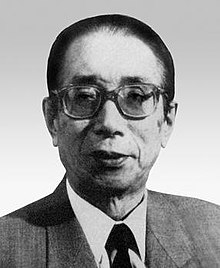Kim Won-gyun
Kim Won-gyun | |
|---|---|
 | |
| Born | 2 January 1917 |
| Died | 5 April 2002 (aged 85) |
| Occupation(s) | Composer, politician |
| Era | 20th century |
| Kim Won-gyun | |
| Chosŏn'gŭl | 김원균 |
|---|---|
| Hancha | |
| Revised Romanization | Kim Won-gyun |
| McCune–Reischauer | Kim Wŏn'gyun |
| [1][2][3] | |
Kim Won-gyun (Korean: 김원균; 2 January 1917 – 5 April 2002)[4] was a North Korean composer and politician. He is considered one of the most prominent,[5] if not the most celebrated,[6] composer of North Korea. He composed "Aegukka" — the national anthem of the country — and "Song of General Kim Il-sung", in addition to revolutionary operas.[5]
Career
In his youth, Kim Won-gyun attended high school but dropped out after three grades.[4] After the liberation of Korea, he wrote his first composition: "March of Korea".[7] Before his musical career, Kim had been only "a farmer who just happened to write [the] 'Song of General Kim Il Sung'".[6] That was in 1946, very early into the cult of personality of Kim Il-sung; the song was the first work of art that verifiably mentions Kim Il Sung, then leader of Workers' Party of North Korea, one of precursors of WPK.[8] After the success of the song, he was asked to compose "Aegukka". As a musician, he was initially self-taught but went to Moscow in order to study there.[9] At some point he attended a music school in Japan.[5] By 1947, when "Aegukka" was adapted as the national anthem of Provisional People's Committee of North Korea,[10] he had risen in status.[6] Other compositions by Kim include: "Democratic Youth March", "Our Supreme Commander", "Glory to the Workers' Party of Korea (WPK)", "Sunrise on Mt. Paektu", "Steel-strong Ranks Advance", "Song of Great National Unity",[11] "We Rush Forward in Spirit of Chollima", and "Song of Anti-Imperialist Struggle".[12]
Kim is credited with contributing to "the creation of the 'Sea of Blood' -type revolutionary operas".[11] It is possible that he worked on the operatic version of Sea of Blood and a symphony based on music from the opera.[13] He is also credited with the opera Chirisan.[14]
Kim served as a composer to National Art Theatre.[7] He also became the head of the Central Committee of the Korean Musicians Union in 1954, and would later become the vice-president and president of the Union.[5] He was the president of the Pyongyang University of Music and Dance since 1960. In 1985, he became the general director of the Sea of Blood Opera Troupe.[5][11] He was the North Korean chairman of the Reunification Music Festival in September 1990.[5] He was also the chairman of the National Music Committee of Korea[15] and honorary member of the International Music Council.[16] Besides his musical activities, he was a deputy to the ninth and tenth Supreme People's Assemblies (SPA).[5] Upon his death in 2002, he held the posts of deputy to the SPA and adviser to the Central Committee of the Korean Musicians Union.[17]
He received many prizes and honors, including Labor Hero, Merited Artist, People's Artist, recipient of the Order of Kim Il Sung and a Kim Il Sung Prize winner.[5][16] The Pyongyang Conservatory was renamed the Kim Won-gyun Conservatory on 27 June 2006.[5][11]
Kim Won-gyun died on 5 April 2002 of heart failure. Kim Jong Il sent a wreath to his bier on the day following his death.[17] Kim Jong Un paid homage to Kim Won-gyun by organizing a concert on the centenary of his birth in 2017.[7]
Text is available under the CC BY-SA 4.0 license; additional terms may apply.
Images, videos and audio are available under their respective licenses.
